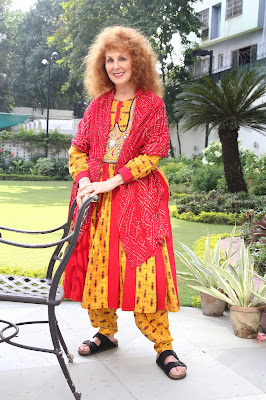She is a singer, an actor, a writer, a social activist and a
teacher. She marched for peace with Dr.
Martin Luther King, Jr. and works with a number of NGOs to alleviate poverty in
the poorest neighborhoods. She is
Lee-Alison Sibley, an American who loves India.
Lee has a Master of Music degree and a Master of Education degree. She has sung, taught, lectured and acted all
over the world. From folk music to opera
to Broadway, Lee has done it all, and while living in Kolkata added
Rabindrasangeet to her repertoire with her album “The Distant Near.”
How did your tryst
with Rabindrasangeet happen? What has been your initial inspiration?
It is interesting that you use the term “tryst” as if it was
a romance and the songs were my lover! I
guess in a way it has been like that since 2002, when I first heard the
songs. I had been reading Tagore poems
for many years before that, since I was young and impressionable, but I hadn’t
heard the music until I was welcomed to Kolkata with a performance at the
American Center by Pramita Mallick. That
changed everything for me – I fell in love with the songs and asked her if she
could teach them to me. I’m fairly sure
Pramita did not think I was serious at first, but as I’m a professionally
trained musician, a singer, I followed up and learned the songs I later
performed with and with other artists.
How challenging was
it initially?
Pramita is really intelligent and savvy – her English is
impeccable. When she heard my voice for
the first time, she knew that my western classical training would not be
appropriate for all the Rabindrasangeet.
She chose those songs whose melodies were adapted from British folk
tunes by Tagore and we both decided my voice was most suitable for those
songs. As Pramita is an excellent
teacher, I learned the songs quickly and started to perform them almost right
away.
What does Tagore mean
to you?
People have heard me describe my first visit to Jorasanko
when I saw where Tagore “breathed his last” and I burst into tears! Tagore was a visionary poet, a man who knew
that societies need to break down borders, who knew women play a most important
role and need education. He was an
internationalist – how I would have loved to be with him when he met Albert
Einstein! He was a risk taker, one who
was not afraid to tell the British to keep their knighthood – he didn’t want it
after what they had done. I admire him
on so many levels – it would take hours for me to explain.
What is your favorite
Rabindrasangeet number?
That is a most difficult question as I love so many of the
songs. When I sing “Ami chini go chini”
I feel I am the bideshini he wrote about. With “Prancay choku na chay” I can flirt and
have fun with the audience. In “Alo amar
alo” I am transported to the light and “Amra shabai raja” reminds me we are all
equal under the universal laws of the heavens.
My first song, taught to me by a Bengali officer at the US Consulate,
Tinku Roy, was “Phuley, phuley, doley, doley” which I have sung hundreds of
times around the world, in NGOs everywhere and even at dinner parties. And it doesn’t stop there…
What is your take on
experimenting with Tagore’s songs?
Would you believe me if I told you I was meant to
sing the
songs, that I was meant to be in Kolkata for three years, that I believe
Tagore
would have appreciated my interpretation of his music? All of this is
how I feel. I left a piece of myself behind when I left Kolkata
and I will always feel at home there. I
believe in Tagore’s philosophies on education, nationalism, the caste
system
and the treatment of women in society. I
think we would have gotten along very well indeed had we met face to
face.
What are your future
plans in this field?
I left Kolkata in 2005, but never stopped singing
rabindrasangeet. I performed at the
Bangla Samelan that year in New York City and at the Bangla Mela in Chicago
where I was also a chief guest. I sang
in New Jersey at a fundraiser for children with cancer, organized by Bengali
Americans and in California in 2011 when I reprised my “Two Worlds into One in
Peace” concert with Odissi danceuse Sanchita Bhattacharya. This year, 2013, I sang “Alo, amar alo” in
Delhi three times during Diwali celebrations.
Clearly, I will never stop singing these songs.




No comments:
Post a Comment